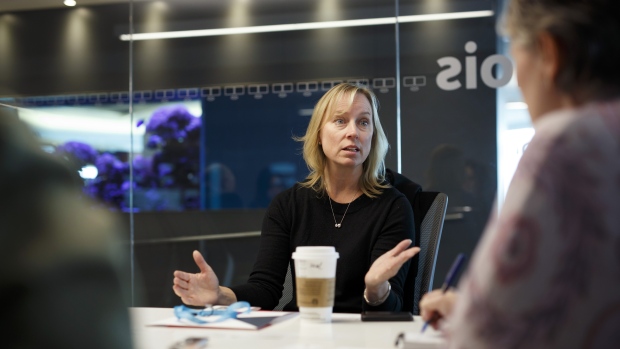Nov 9, 2018
When it comes to tech funding, women should ask for more: BDC Capital
, Bloomberg News

Michelle Scarborough, who runs one of the world’s largest venture capital funds dedicated to female-led startups, sees one big difference between men and women in the space: men demand more money.
Coaching women to make more forceful pitches is one of the things Scarborough does as managing director of the $200-million fund she runs for the Business Development Bank of Canada.
A man might explain how he’ll meet his sales target and ask for $5 million to get him there, said Scarborough. A woman will tell her story and ask for help — not necessarily money.
“The language is very different, the ask is very different,” Scarborough, 49, said in an interview in Bloomberg’s Toronto office. “Many women will ask for much less or they will agree to accept much less.”
After more than 20 years as an entrepreneur and investor, including at Toronto-based private equity firm Kensington Capital Partners, Scarborough said asking for what is necessary is serious business. She herself went back to BDC, a government-owned corporation, to ask the fund be increased from $70 million in an effort to move the needle on gender dynamics in Canada’s tech industry.
The Women in Technology Venture Fund invests directly in companies that have a female founder, co-founder or senior-level executive, as well as other funds and creating an ecosystem to support women. The Toronto-based fund was set up in 2016 and plans to double staff to 15 people.
Scarborough sees no shortage of companies worthy of funding. She has deployed $10 million directly into about 20 companies since joining the bank last year and is on the verge of investing in two new opportunities, aiming for returns of two times the original investment.
One of the companies backed by the fund has already been sold, returning 1.9 times, a “decent rate of return, considering the fund held this investment for less than two years,” she said, declining to name it. Other investmentsinclude Montreal-based Lufa Farms, which delivers local and rooftop produce direct to consumers, and Mimosa Diagnostics, a company developing a hand-held device to image feet to ward off complications from diabetes.
There’s fertile ground for investment. Companies soaked up $3.2 billion in 393 venture capital deals in Canada in the first three quarters of the year, the most since 2001, according to data from the Canadian Venture Capital & Private Equity Association.
While the association doesn’t break down how much of that flowed to women founders, U.S. data suggests not much. In 2017, US$68.2 billion went to U.S. companies founded by men, compared with US$1.9 billion for startups with solely female founders, data compiled by PitchBook Data Inc. showed.
Only five per cent of Canadian tech companies have a solo female founder while 13 per cent have a female co-founder, according to a study by #movethedial, a group dedicated to increasing women in tech.
“I was actually surprised by the number of women that come to me and said ‘I pitched my story and I was sort of dismissed,’” said Scarborough. “Or women who said, ‘I was actually told in a room that I am very pretty and that I should maybe think about bringing an old white-haired guy onto my team to help me because that would be better for me and I’d get further.’”
But a growing number of funds are investing in women-run businesses. In the U.S., BBG Ventures, led by former Gilt Groupe Inc. CEO Susan Lyne, looks for companies with at least one female founder. Forerunner Ventures, started by Kirsten Green, has seen success betting on women-led projects in e-commerce. And the Female Founders Fund raised US$27 million for a new seed fund in May. Pension funds have also been studying making investments in these ventures, according to Scarborough.
How the fund evolves will depend on how companies perform, Scarborough said. The fund was modeled to last 10 years, but can stay longer in a company if necessary. They are currently looking at bigger investments and could inject up to $25 million in one single company.
“We are expected to make money. As much as I’d like to be philanthropic, that is not what this exercise is about," she said.







